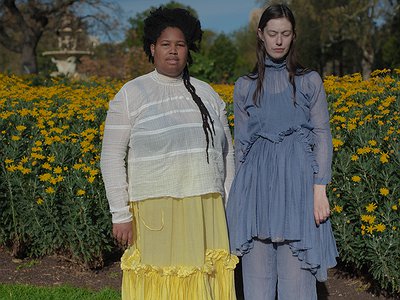Could you take us through a day in your life, from a possible morning routine through to your work? Do you have a fixed schedule? How do music and other aspects of your life feed back into each other - do you separate them or instead try to make them blend seamlessly?
I have a green tea in the morning and feed my dog. I work a day job in conservation and also study horticulture so my schedule changes a little day to day. I talk with Takiaya on the phone, go walking in the bush, swim when the weather is nice, listen to music and sing a lot. This year the band has been focussed on everything except the actual playing of music so that has been very different. We’ve been really busy working up to the release of Gas Lit. Music is always a priority in my life, sometimes other aspects of life feel more separate if I’m on tour for example.
Could you describe your creative process on the basis of a piece or album that's particularly dear to you, please? Where did the ideas come from, how were they transformed in your mind, what did you start with and how do you refine these beginnings into the finished work of art?
Our new album Gas Lit came together really organically. Ruban Nielson from Unknown Mortal Orchestra contacted us with interest in producing our next album. The album is about trying to describe feelings that have either been made invisible, or called into question. We breathed deeply before we wrote the music and connected with each other and our ancestors.
There are many descriptions of the ideal state of mind for being creative. What is it like for you? What supports this ideal state of mind and what are distractions? Are there strategies to enter into this state more easily?
We have had some really productive music writing experiences off the back of touring. Then sometimes I thrive on having had some space from playing music to go in to creating feeling fresh. The most important thing for me with creating is having a strong connection with the people I collaborate with, and a connection to my ancestors.
How is playing live and writing music in the studio connected? What do you achieve and draw from each experience personally? How do you see the relationship between improvisation and composition in this regard?
They are inextricably connected. We write music with the live experience at the forefront of our intentions. We write our music at the same volumes we perform at. When playing live there is so much energy from people in an audience to interact with and draw on. We compose our music fully, and it often evolves slightly after touring. Our music is spacious which allows for improvisation and live performances inevitably require some room for this.
How do you see the relationship between the 'sound' aspects of music and the 'composition' aspects? How do you work with sound and timbre to meet certain production ideas and in which way can certain sounds already take on compositional qualities?
The two aspects of music are so deeply interwoven. These elements are constantly interacting with and informing one other. Personally, I begin with the sound aspect to shape the composition. My bandmate is classically trained and has a talent for both composition and tone.
Our sense of hearing shares intriguing connections to other senses. From your experience, what are some of the most inspiring overlaps between different senses - and what do they tell us about the way our senses work? What happens to sound at its outermost borders?
This is a huge focus for us as a band. Music is not an exclusively audible art form. We are completely invested in communicating with sonic vibrations which are received not just in the ear but the entire body. The most exciting thing that sound frequencies do is communicate.
Art can be a purpose in its own right, but it can also directly feed back into everyday life, take on a social and political role and lead to more engagement. Can you describe your approach to art and being an artist?
The relationship between our art and politics is tightly woven. What is happening to people and the earth all informs our lives and our art. We will continue to talk about the importance of decolonisation, the destruction of white supremacy and prison industrial complex and the survival of indigenous sovereignty.
It is remarkable, in a way, that we have arrived in the 21st century with the basic concept of music still intact. Do you have a vision of music, an idea of what music could be beyond its current form?
Music is a great facilitator of connecting with the past. Through music and practicing art we can connect with ancestors, and engage in lines of communication centuries old. Art helps us not just imagine but create futures. I hope music continues to evolve and communicate between people and the earth and all living things.


